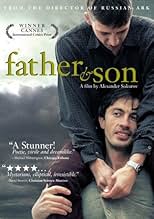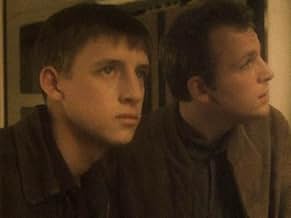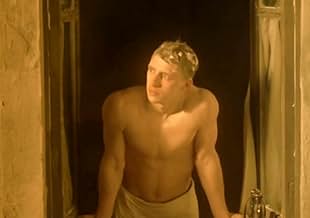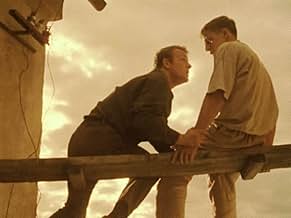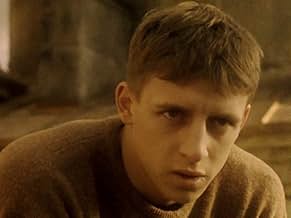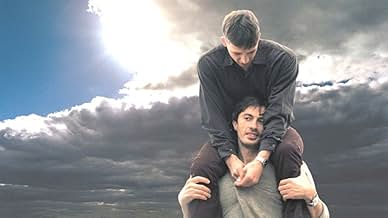A father and his son live together in a roof-top apartment. They have lived alone for years in their own private world, full of memories and daily rites. Sometimes they seem like brothers. S... Read allA father and his son live together in a roof-top apartment. They have lived alone for years in their own private world, full of memories and daily rites. Sometimes they seem like brothers. Sometimes even like lovers. Following in his father's path, Aleksei attends military school... Read allA father and his son live together in a roof-top apartment. They have lived alone for years in their own private world, full of memories and daily rites. Sometimes they seem like brothers. Sometimes even like lovers. Following in his father's path, Aleksei attends military school. He likes sports, tends to be irresponsible and has problems with his girlfriend. She is ... Read all
- Director
- Writer
- Stars
- Awards
- 2 wins & 1 nomination total
- Director
- Writer
- All cast & crew
- Production, box office & more at IMDbPro
Featured reviews
Father (Andrei Shetinin) and son (Alexei Nejmyshev) live together on the top floor of an apartment house and have done so for many years since the death of their mother. Their world looks like a sanctuary but may be a prison. It was while attending a school for air cadets that the father met his wife and bore his son, now 20. His son's physical appearance reminds the father of his late wife and their bond is intense and emotional. Alexei attends military school like his father who left military service against his will and wants his son to pick up where he left off. He has a girl friend but there is a distance between them. She is jealous of his relationship with his father that to her appears overprotective and he does not want to give up his father's closeness.
Alexei's father is conflicted about looking for a job in a different city and seeking a new wife. They must decide whether to continue their lives together or independently. The struggle for freedom and independence is mutual but they are held together by a transcendent love. Father and Son is an enigmatic but deeply poetic film about the complex bond that a son has with his father. While the film is open to interpretation from different cultural, psychological, or religious points of view (the film says, `A father who loves his son crucifies him. A son who loves his father sacrifices himself for him'), for me, the best approach is to avoid the temptation to analyze and just bathe in the warmth of its loving glow.
The director has declared himself shocked and irritated by our feeling that the content is homoerotic, and therefore incestuous. There are cultural differences here: one remembers the Russian soldiers in Cartier-Bresson's Fifties photo holding hands in a museum. Americans are over-touchy about homoeroticism, none the less so if they're gay, and one can't question Sokorov's assertion that for him, this is a poem about parental relationships along male lines, about the son's need to break away on his own and become a man, and nothing at all about the homoerotic. The beautiful tussling bodies and the two almost clone-like men are meant innocently as ways of showing intimacy poetically and visually.
Sokorov is an avantgardist, and it's perhaps a bit of an accident that his previous film, Russian Ark, became so wildly popular with the non-Russian art house crowd. Somehow the technical feat of the single take and the variety, color, and prettiness of the images endlessly unfolding in Russian Ark rendered it more palatable to a general audience than usual. His stylistic methods generally demand great patience and openness from an audience. But Father and Son grows on one. It may seem bland, boring, incomprehensible at first, but eventually, if you let it, if you absorb its language and give in to its mood, it works its magic. The movie also has a timeless quality. It may evoke Eisenstein or Cocteau. Its Lisbon setting, also magical, is nowhere and everywhere, a place of the imagination that could be Russia, or Europe, or Baltimore in the Fifties.
Father and son apparently have lived together in a certain isolation for a long time. Sokorov creates his own space. Out of the dark apartments the men leap across a board onto the adjoining roof, where a friend of the son also comes out. The men jump on the board with athletic abandon. They could be gymnasts or ballet dancers, so great is their agility. There's also something incredibly manly about their voices as they talk in low voices in the Russian tongue (which I don't know at all); this effect also was created in Vozvrashchnenie (The Return, by Andrei Zvyagintsev), another recent Russian film that had its own unique mood and look. You walk out of the theater listening to American voices and they sound squeaky and puerile. It's not so important what they're saying; the literal meaning isn't significant. It's a kind of music, and it's accompanied by a muted soundtrack of classical music by Sergei Moshkov that works another kind of suble spell with its hints and portents. (The sound track is unique.) This could be a silent film. The focus is intensely on the visual. The cinematography by Aleksandr Burov is beautiful.
There is a sequence of scenes, but very little that can be described as a story line. There's a neighbor and friend of Aleksei's, Sasha (Aleksandr Razbash), whose father has disappeared (a rhyming and contrasting subplot). He and Aleksei (the son) go down into town and take a long tram ride. In this uneventful film, that tram ride is a big deal: it's the main event, in a way, and the dreamlike, gorgeous photography gives the ride an unforgettable quality. Aleksei and his friend, and Aleksei and his father, stand so close together you think they're going to kiss each other. There's lots of manly affection here: it really is manly, even if it takes you a while to grasp that. Aleksei also has a girlfriend and he breaks up with her because she has acquired a mysterious older boyfriend, although he has just dreamed of their having a child. Abstractly, in these details, the idea of fatherhood and of the intervention of a father in the life of a son are alluded to.
The girlfriend is a bit unworthy in this macho film. She seems a pinched little girl like a beggar in a Charlie Chaplin movie.
These details can only be sketched in because that's the way they are. When one sees Father and Son one realizes that the plotlessness of Russian Ark wasn't specific to that `story,' but Sokorov's usual modus operandi.
The pretty homoerotic sequences in Father and Son recall Derek Jarman's arty and lovely but repetitive dramatizations of Shakespeare's male-love sonnets in The Angelic Conversation(1985) -- except here there is no textual basis, so the movie's relatively rudderless, but also flows from sequence to sequence more seamlessly. Though the message, if any, is that father-son love is a wonderful thing, there's also the son's fatalistic remark, ''A father's love crucifies, and a loyal son accepts crucifixion.''
It's hard to tell at times if Sokorov's film is a big snooze or a beautiful reverie. Due to the plotlessness and the glacial pace, this can hardly be expected to catch on with mainstream audiences. Father in Son is best appreciated not as a narrative but a visual poem. It takes you into another world -- a world you may find alien and yet not want to leave.
This is part of a trilogy. There has been Mother and Son, now this, and there will be Two Brothers and a Sister.
Apparently Sokurov intended to show that the ambivalence of their lover-like relationship is due to the father's unresolved feelings for his dead wife, but the film is not entirely successful in communicating that. Their closeness inspires jealousy in the son's girlfriend, a neighbour and a visitor, yet the homo eroticism in Father and Son is not just between them, but in the way the camera views other men, particularly soldiers. Although this allegedly unintentional subtext could offend, it does not, due to the hyper-real, mythic tone. The slow pace of the film is offset by a pervasive, abstract sensuality, emphasised by Alexander Burov's beautiful cinematography. Whispering kettles and dripping taps form an industrial ambiance that helps to slow time down and frame the background a dark quiet house that is as insular as this familial relationship.
Although Father and Son will frustrate those seeking a more plot-driven film, it is memorable. The indefinable closeness between the two men is never threatening. It merely emphasises the similarity between what philosopher CS Lewis described as the Four Loves storage (familial love), love between friends (philia), eros (sexual love) and agape (spiritual love).
***/***** stars.
Did you know
- TriviaFilm debut of Aleksei Neymyshev.
- ConnectionsFeatured in Sokurovin ääni (2014)
- How long is Father and Son?Powered by Alexa
Details
Box office
- Gross US & Canada
- $39,291
- Opening weekend US & Canada
- $4,541
- Jun 20, 2004
- Gross worldwide
- $73,351



